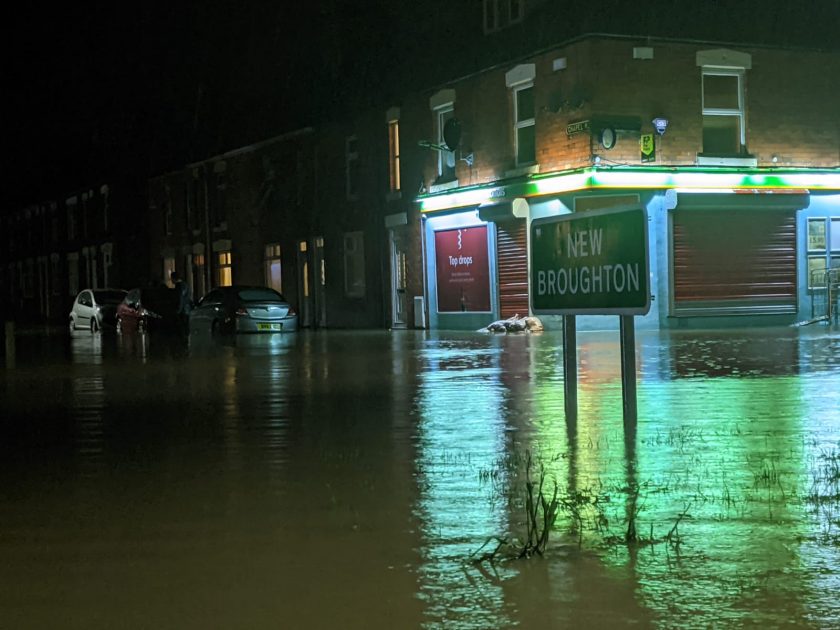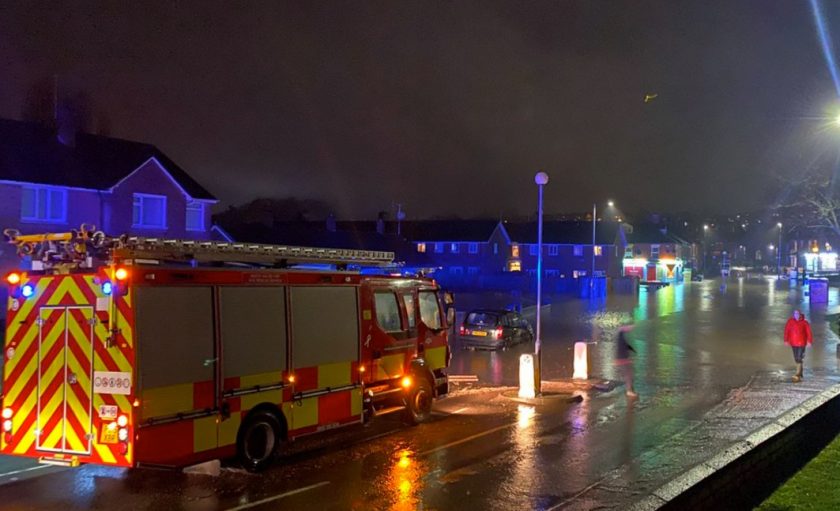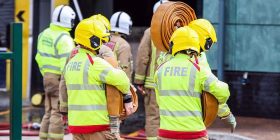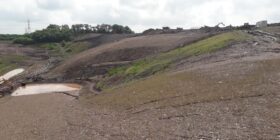Damning verdict on council response to New Broughton floods set for debate – “complete lack of engagement and assistance in the first critical four hours”

Councillors whose wards were badly affected by flooding earlier this year are set to raise their concerns and speak of the issues they encountered in trying to contact the council during Storm Christoph.
On January 20 the region was hit by heavy rainfall, causing flash flooding and road closures across Wrexham throughout the day.
However several areas of the county borough were particularly affected by flooding, with homes evacuated in New Broughton, Bangor-on-Dee and Almere Farm, near Holt.
Parts of Rossett and the Ceiriog Valley were also hit by flooding – with the heavy rainfall also causing a landslide in Newbridge.
In February Wrexham.com reported that a group of councillors representing the worst affected wards had called for more information into the council’s response to the flooding and how such events can be prevented in the future, and we also asked the council for details on the incident – however were told a ‘lessons learned’ exercise was taking place.
A report due before councillors today is part of the outcome of that process, and documents give a breakdown of each ward hit by flooding that day and a timeline of when the first incidents were reported and how the local authority responded.
In New Broughton, which later saw water levels reach waist height, the first incident of the evening is reported to have occurred when the river burst its banks and flooded 7 bungalows.
The report states that this was initially handled by the Council’s out of hours call-line (run by Delta) and then by officers from Housing. The farcical response is documented in Cllr Nigel Williams’ account, “At approximately 19:00 I was told someone from “out of hours” had arrived and wanted to speak with me, the man I met was from our out of hours service, I asked him what the plans were and he said he usually just secured empty properties, did not know what to do and he would call for help. At this point an officer from WCBC Housing also came, but sat in her car making calls unsure what to do.”
The report adds that the regional emergency planning unit (NWCREPS) were not initially notified by the emergency services about the incident. They were made aware by Streetscene and Housing crews telephone their Duty Officer from the scene.
Eventually some residents from the Berse Road area had to be evacuated from their homes due to the flooding, with the report stating that whilst they were accommodated, there was “extreme pressure on the available accommodation due to it being full due to the rough sleeper and Covid-19 issue.”
In terms of Bangor-on-Dee, the report explains that: “A major incident emergency was declared and the Council activated a virtual Emergency Planning and Response Team (EMRT), whose Humanitarian Assistance Team set up rest centres in Ruabon and Plas Madoc and whose Information Team issued communications to Members and the public) and joined multi-agency tactical (‘Silver’) and strategic (‘Gold’) meetings chaired by North Wales Police (NWP) to coordinate a response. Colleagues from Environment & Technical had already been deployed to deal with road closures.
“A number of residents in those parts most at risk from flooding were evacuated to their family’s and friends’ homes and to the rest centres using 4x4s driven by 4×4 Wales volunteers (at the request of the Police).
“Teams worked throughout the night and next day to assess the risks (which began to reduce, obviating the need to evacuate the whole village) and respond to them and to support the community in the village and those displaced to rest centres.”
The report highlights individual comments from the councillors whose wards were most affected during Storm Christoph.
Cllr Nigel Williams, Gwenfro ward, gave a step by step breakdown of what happened that day and has called for the River Gwenfro to be checked for “future risks and remedial actions taken on the bank if needed and the stretch of river to be regularly inspected.”
He said that during the evening when emergency services had been called and residents had been evacuated that he had felt “completely on my own coordinating our response” and that he kept “asking Cllr Alan Edwards to ask for help from the council but none came.”
In terms of evacuating residents Cllr Williams added: “The police asked me to arrange an emergency evacuation centre to decant residents to who were being brought out in inflatable dinghies.
“I telephoned the local vicar and asked could he open the church hall in Southsea which he did within 15 minutes.
“The emergency services then asked me to coordinate and arrange for transportation for the residents, many of whom were elderly with serious health conditions. I managed to get a group of volunteers to get their vehicles who then transported residents to the church hall in Southsea.
Cllr Williams notes that the Council Leader Mark Pritchard turned up at around 8:30pm, but expressed a lack of wider support “During the night I felt completely on my own coordinating our response.”
“No sandbags came from WCBC.”
In answering the question “What could we have done better?” Cllr Williams wrote, “This emergency situation was not the fault of the authority, but I feel the situation was made far worse due to the complete lack of engagement and assistance in the first critical four hours.”
Cllr Williams also noted in the weeks after the flood he asked for sandbags to be situated in the village, however faced “much initial resistance”, and finally some were delivered.
Similar comments are made by New Broughton Cllr Alan Edwards, who said that whilst he does not blame anyone for the unprecedented flooding, “now we know the problems if flooding happens again there will be no excuse.”
He said: “My main criticism was that we could not get through to a number to someone to co-ordinate things. It was left to councillors to phone the vicar to get the church schoolroom open in Southsea and to arrange transport.
“I always thought that in an emergency a response group would be together in the Guildhall to co-ordinate things. This did not happen.
“No sandbags were provided.”
Cllr Hugh Jones, Rossett ward, highlighted ‘delays in our response’ to flooding but praised council staff once they attended. Cllr Jones was another highlighting issues around sandbags, “We need greater clarity around sandbag policy. In some areas of the ward we provided sandbags and in other we said it is not our policy.”
Cllr Jones also pointed to the planning system and historic promises in his answers to ‘what can be done different’, “We could have implemented the pledge made by [previous and current Chief Officers] at a Public Meeting 9 years ago to implement a relief scheme ‘this year’. We could have not signed off the Pippin Lane Planning as having met the conditions on drainage when the developer had cut off the drainage into the pond.”
Cllr Rodney Skelland, Bronington ward, said “the biggest lesson learned is that the Emergency Plan has amply demonstrated it’s not fit for purpose.”
He said: “I cannot praise and thank the NRW (Natural Resources Wales) enough for all their efforts and professionalism going back over many years improving and maintaining the flood defences around the village, again the defences worked very well and performed as designed, there was no ingress of water into the village from the river.
“The council unfortunately is a different story, as a councillor my main aim has always been to prevent the village from flooding, I’ll send you my CV in the form of a letter reminding Officers of my past involvement with the village flooding issues when not invited to a meeting with the M.P. Flood Wardens Community Council Chair etc.”
“The flooding that occurred in the village was entirely caused by areas that are the responsibility of the council and not NRW and fall well within the responsibility of the Environment Department, the flooding was entirely preventable and should not have occurred, it resulted in several properties being flooded and people having to be evacuated with roads out of the village closed.”
Cllr Skelland also highlighted that in his view if he was being called on to conduct a village evacuation the emergency would likely be too great, “I’ve never involved myself too much with the business of opening the school and village evacuation because if it gets to that stage as far as I’m concerned the emergency plan has failed dramatically and inarguably demonstrated it’s not fit for purpose”
There is also praise for the council’s response that evening in the reports, with Holt councillor Michael Morris, who said: “I did not receive any adverse comments from residents in terms of how the Council handled the crisis and my general view is that the response was appropriate and prioritised to meet the needs of those worse affected.
“The updates and information provided by WCBC to Members were, in my view, helpful and informative. I would say that the contribution made by my street scene co-ordinator locally and over the wider area was very good.”
However in terms of what could have been done better, Cllr Morris continues onto say: “There was some criticism that the Council does not
effectively address long standing known issues by using legislative powers against those landowners who do not maintain their watercourses or indeed addressing issues that the Council have responsibility for.
“There was also a perception of an element of ‘passing the buck’ to others such as NRW. A more cohesive approach could perhaps be strengthened.”
Addressing lessons that need to be learnt, including reviewing flood plans, “better and earlier triggers (to avoid complacency or an assumption that agencies are ‘crying wolf’)” in terms of weather warnings, road closures, evacuations, communication and rest centres.
The report adds: “Following the emergency incident, our partners have undertaken similar exercises and identified projects for further assessments, remedial work and enhancement. To ensure we can co-ordinate our work and mutual support and assistance, Council officers have held a number of meetings with NRW and have agreed and prepared joint statements with updates on our work.
“9 Officers from WCBC and NRW have continued to meet on a monthly basis since the emergency, sharing intelligence and working collaboratively on repairs and improvement projects to build in additional resilience. The following paragraphs detail the work undertaken at those areas experiencing the significant issues, but we also around 30-40 individual further repair and improvement projects in development.”
The report will be considered by members of the council’s homes and environment scrutiny committee today where councillors will probe the council response to the storm and floods, plus the much awaited ‘lessons to be learnt’ will be uncovered.
Spotted something? Got a story? Email [email protected]













